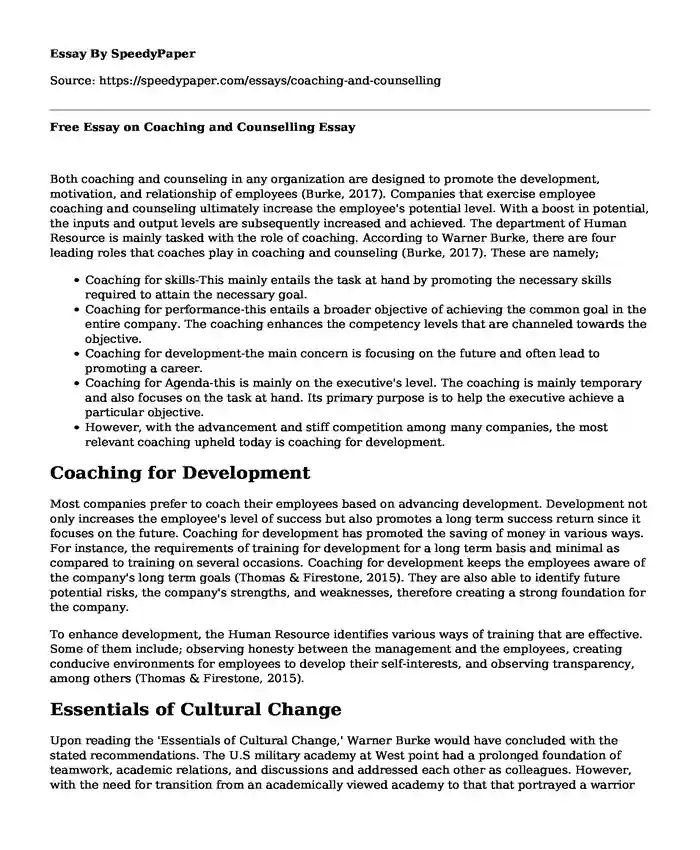
| Type of paper: | Essay |
| Categories: | Knowledge Human resources Counseling Organizational culture |
| Pages: | 3 |
| Wordcount: | 658 words |
Both coaching and counseling in any organization are designed to promote the development, motivation, and relationship of employees (Burke, 2017). Companies that exercise employee coaching and counseling ultimately increase the employee's potential level. With a boost in potential, the inputs and output levels are subsequently increased and achieved. The department of Human Resource is mainly tasked with the role of coaching. According to Warner Burke, there are four leading roles that coaches play in coaching and counseling (Burke, 2017). These are namely;
- Coaching for skills-This mainly entails the task at hand by promoting the necessary skills required to attain the necessary goal.
- Coaching for performance-this entails a broader objective of achieving the common goal in the entire company. The coaching enhances the competency levels that are channeled towards the objective.
- Coaching for development-the main concern is focusing on the future and often lead to promoting a career.
- Coaching for Agenda-this is mainly on the executive's level. The coaching is mainly temporary and also focuses on the task at hand. Its primary purpose is to help the executive achieve a particular objective.
- However, with the advancement and stiff competition among many companies, the most relevant coaching upheld today is coaching for development.
Coaching for Development
Most companies prefer to coach their employees based on advancing development. Development not only increases the employee's level of success but also promotes a long term success return since it focuses on the future. Coaching for development has promoted the saving of money in various ways. For instance, the requirements of training for development for a long term basis and minimal as compared to training on several occasions. Coaching for development keeps the employees aware of the company's long term goals (Thomas & Firestone, 2015). They are also able to identify future potential risks, the company's strengths, and weaknesses, therefore creating a strong foundation for the company.
To enhance development, the Human Resource identifies various ways of training that are effective. Some of them include; observing honesty between the management and the employees, creating conducive environments for employees to develop their self-interests, and observing transparency, among others (Thomas & Firestone, 2015).
Essentials of Cultural Change
Upon reading the 'Essentials of Cultural Change,' Warner Burke would have concluded with the stated recommendations. The U.S military academy at West point had a prolonged foundation of teamwork, academic relations, and discussions and addressed each other as colleagues. However, with the need for transition from an academically viewed academy to that that portrayed a warrior look, things took a turn for the worst. The new management failure to live up to expectations due to; poor organizational knowledge, lack of proper communication of cultural change, disempowered subordinates, and improper handling of Subordinate staff issues.
From these experiences, the lesson learned was the need to address the four leading roles of coaching and what they entail. The author suggests that the proper solutions would be better communication and indulgence of subordinates in decision making. The management out to have communicated the cultural change process better, as the employees thought that their jobs were at stake. The need to apply to coach for Agenda was necessary to bring everyone on board into attaining the needed cultural change.
Warner Burke would have made several additional changes to retain the serenity experienced in the past. For instance, shaping more meaningful and productive relationships with the junior staff would be convenient (Burke 2017). This would play an essential role in channeling the efforts of every military personnel towards the new cultural change. Additionally, leadership rather than management would have been the proper strategy of controlling things. As in the article, deploring managerial skills led to the new general resigning within ten months. Leadership skills would entail guiding, listening, giving feedback, and motivating the military personnel on various issues.
References
Thomas, T., Thomas, J., & Firestone, H. (2015). Mentoring, coaching, and counseling: Toward a common understanding. Military Review, 95(4), 50-57.
Burke, W. W. (2017). Organization change: Theory and practice. Sage publications.
Cite this page
Free Essay on Coaching and Counselling. (2023, Apr 05). Retrieved from https://speedypaper.com/essays/coaching-and-counselling
Request Removal
If you are the original author of this essay and no longer wish to have it published on the SpeedyPaper website, please click below to request its removal:
- Love Definition Essay Examples
- Education Essay Sample: Inclusion of Students Who Are Blind and Visually Impaired
- Evaluating a Nursing Model, Free Essay Example
- Leading Positive Change in an Organization, Essay Sample
- Essay Example Dedicated to U.S. Imperialism
- Biography of Tom Hanks
- Essay Sample on Cultural Anthropology: Kosher Chinese
Popular categories




